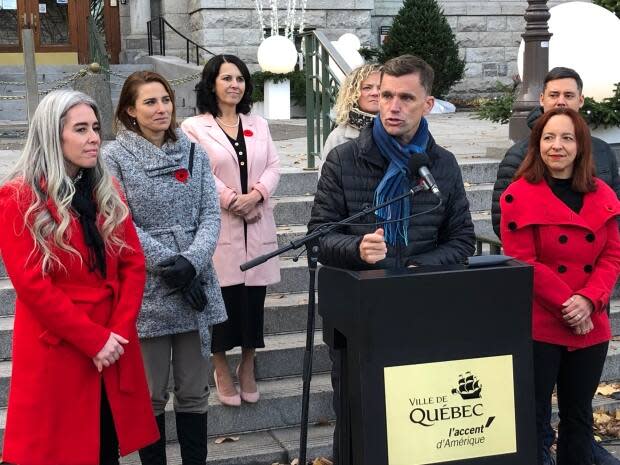New party has just 1 seat on Quebec City council but hopes to make city greener

A new municipal party that brands itself as a progressive voice and a champion for the environment is making its debut at city hall in Quebec City.
Transition Québec's party leader, Jackie Smith, got a seat on city council after her running mate Madeleine Cloutier won in the Limoilou borough with 38.5 per cent of the votes on Sunday.
"It's so exciting," said Smith. "Now we actually get to sit at city hall and negotiate and put climate change on the front burner."
The 40-year-old Ontario native, who lost the race for mayor to Bruno Marchand, has been calling Quebec City home since she moved there in 2005.
Environmental policies set party apart, expert says
Smith said that focusing on the environment is what helped break through to voters.
"There's a real concern about climate change that's palpable," she said. "Nobody was representing that."
The party campaigned on protecting the environment and making the capital a greener city.
It is notably strongly opposed to the province's controversial third link project, a plan to build a $7-billion tunnel between Quebec City and the municipality of Lévis, across the St. Lawrence.
Political scientist Philippe Dubois said the current momentum for fighting climate change played in favour of the party, because a lot of residents were attuned to the issue.
"Since they were the only ones talking about it a lot and making it a central issue, they managed to set themselves apart," said Dubois, who is completing a PhD on municipal election campaigns at Laval University in Quebec City.
The researcher said Smith being an anglophone was not a big deal during the campaign because, although her accent is noticeable, she was proposing to make Quebec City an international champion for the French language and appeared authentic in her desire to improve her French.
"It was actually quite smart politically," he said.
Filling a gap in municipal politics

With just one seat on council, Smith will have to negotiate with the other municipal parties, including the new mayor Bruno Marchand and the six elected councillors from his party Québec Forte et Fière.
She will also have to collaborate with 10 councillors from Équipe Marie-Josée Savard, the party that succeeded outgoing mayor Régis Labeaume, and four councillors from Québec 21.
It's a challenge she's ready for, she said, noting there were a lot of green initiatives that the parties already agreed on.
"You know, Mr. Marchand is a cyclist. Okay — let's work on cycling infrastructure," she said, adding the priority for her was to look at what issues people agreed on — such as saving trees or improving road safety — and acting on them first.
Dubois said Smith will likely have some influence over her fellow councillors, because her party got a lot of public support, especially in the city's centre, so they will be compelled to listen to what she has to say.
"If she continues in the same vein as her campaign, she risks becoming one of the main political figures in Quebec City simply because there's a space [for what she's offering]," he said.
He said she could force the other parties to position themselves on issues that affect the environment.
"If she talks about it and if she has a more left-leaning position, then probably she'll manage to shift the municipal administration toward the left a bit."
The city said in a statement that elected officials will be sworn in early next week.


